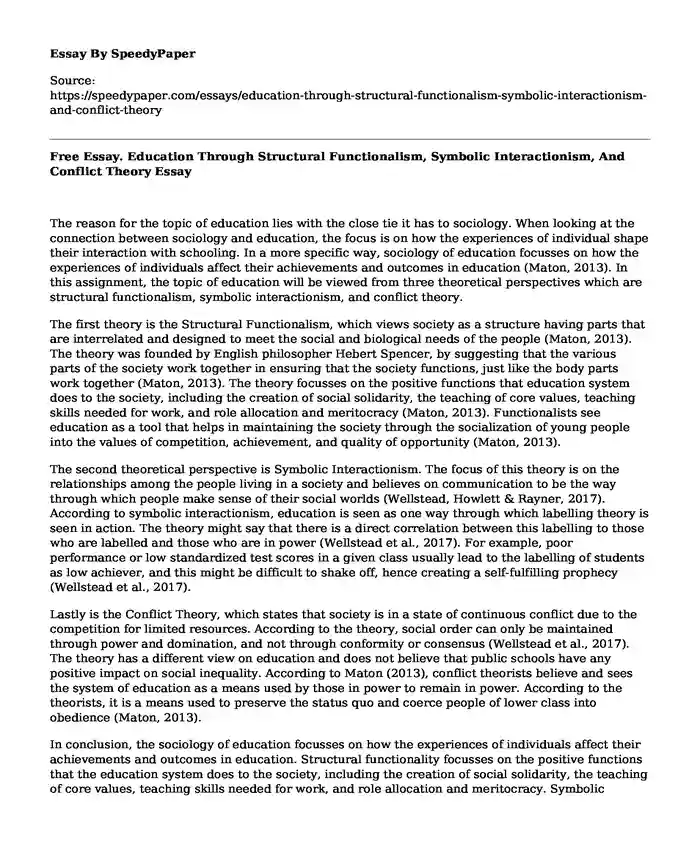
| Type of paper: | Essay |
| Categories: | Learning School Conflict resolution |
| Pages: | 3 |
| Wordcount: | 596 words |
The reason for the topic of education lies with the close tie it has to sociology. When looking at the connection between sociology and education, the focus is on how the experiences of individual shape their interaction with schooling. In a more specific way, sociology of education focusses on how the experiences of individuals affect their achievements and outcomes in education (Maton, 2013). In this assignment, the topic of education will be viewed from three theoretical perspectives which are structural functionalism, symbolic interactionism, and conflict theory.
The first theory is the Structural Functionalism, which views society as a structure having parts that are interrelated and designed to meet the social and biological needs of the people (Maton, 2013). The theory was founded by English philosopher Hebert Spencer, by suggesting that the various parts of the society work together in ensuring that the society functions, just like the body parts work together (Maton, 2013). The theory focusses on the positive functions that education system does to the society, including the creation of social solidarity, the teaching of core values, teaching skills needed for work, and role allocation and meritocracy (Maton, 2013). Functionalists see education as a tool that helps in maintaining the society through the socialization of young people into the values of competition, achievement, and quality of opportunity (Maton, 2013).
The second theoretical perspective is Symbolic Interactionism. The focus of this theory is on the relationships among the people living in a society and believes on communication to be the way through which people make sense of their social worlds (Wellstead, Howlett & Rayner, 2017). According to symbolic interactionism, education is seen as one way through which labelling theory is seen in action. The theory might say that there is a direct correlation between this labelling to those who are labelled and those who are in power (Wellstead et al., 2017). For example, poor performance or low standardized test scores in a given class usually lead to the labelling of students as low achiever, and this might be difficult to shake off, hence creating a self-fulfilling prophecy (Wellstead et al., 2017).
Lastly is the Conflict Theory, which states that society is in a state of continuous conflict due to the competition for limited resources. According to the theory, social order can only be maintained through power and domination, and not through conformity or consensus (Wellstead et al., 2017). The theory has a different view on education and does not believe that public schools have any positive impact on social inequality. According to Maton (2013), conflict theorists believe and sees the system of education as a means used by those in power to remain in power. According to the theorists, it is a means used to preserve the status quo and coerce people of lower class into obedience (Maton, 2013).
In conclusion, the sociology of education focusses on how the experiences of individuals affect their achievements and outcomes in education. Structural functionality focusses on the positive functions that the education system does to the society, including the creation of social solidarity, the teaching of core values, teaching skills needed for work, and role allocation and meritocracy. Symbolic interactionalism views education as one way through which labelling theory is seen in action. Lastly, conflict theory views education as a means used by those in power to remain in power.
References
Maton, K. (2013). Knowledge and knowers: Towards a realist sociology of education. Routledge. http://legitimationcodetheory.com/wp-content/uploads/2018/05/Maton-2014-Ch-1.pdf
Wellstead, A., Howlett, M., & Rayner, J. (2017). Structural-functionalism redux: adaptation to climate change and the challenge of a science-driven policy agenda. Critical Policy Studies, 11(4), 391-410. http://www.sfu.ca/~howlett/documents/Wellstead%20et%20al.%20-%202016%20-%20Structural-functionalism%20redux%20adaptation%20to%20clim.pdf
Cite this page
Free Essay. Education Through Structural Functionalism, Symbolic Interactionism, And Conflict Theory. (2023, Aug 27). Retrieved from https://speedypaper.com/essays/education-through-structural-functionalism-symbolic-interactionism-and-conflict-theory
Request Removal
If you are the original author of this essay and no longer wish to have it published on the SpeedyPaper website, please click below to request its removal:
- Free Essay on the Goals of College Essays
- Should Drug Offenders Go to Prison? Get the Answer in the Free Essay
- Paper Sample Comprising a Psychology Learning Project Report
- Annotated Bibliography on Disability Services, Free Example
- Essay Sample: An Elective Subject
- Free Essay: How Would a Supporter of Natural Law View the Use of Torture?
- Essay Example on Conflict Between a Christian Conscience and Public Law
Popular categories




